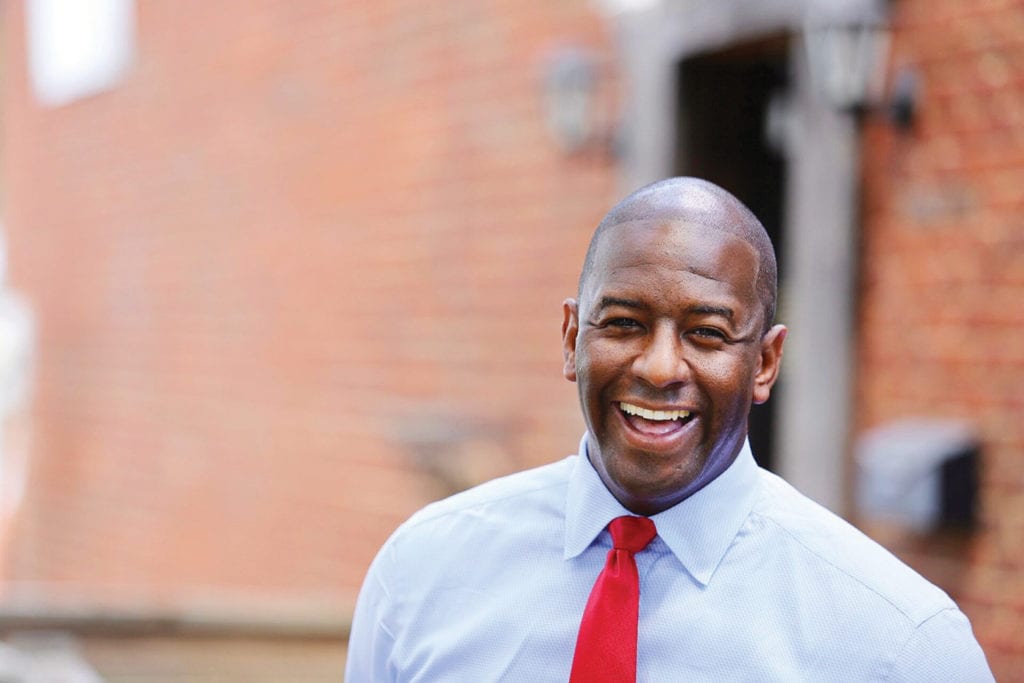
Andrew Gillum came within a rounding error of becoming governor of the nation’s third-largest state by turning out 2 million voters who had never before participated in elections.
The former Tallahassee mayor is now on a crusade to register another million hidden voters to deliver Florida to national and statewide Democrats for generations to come while advancing a progressive agenda in between elections.
“When you do the difficult work of democracy building, it will outlast any candidate,” said Gillum during a recent interview. “We’re a state that is in vogue when we get to an election year. But when it’s no longer a presidential election or even a gubernatorial election, there is a big sucking sound of money, talent and organizational strength that leaves the state. We need to build something more lasting, more structured, that outlasts any one election cycle.”
“Bring It Home Florida,” named after Gillum’s signature campaign phrase, was registered in March as a third-party voter registration group aiming to tip the balance in favor of Democratic candidates and causes like the successful ballot question in Florida, supported by 65 percent of voters, restoring voting rights to felons.
There are an estimated 1.5 million Floridians with felony records who have lost their right to vote. Overall, there are 4.9 million registered Democrats in the state, 4.7 million Republicans and 3.6 million Independents. According to Gillum, “There are 4 million in my state who are eligible to be registered but who are not. We’re going to go after a quarter of that.”
Florida’s 29 electoral votes are highly prized in presidential politics, with President Trump focused on carrying the Sunshine State in his column once again in 2020. The importance of Florida was captured during the 2000 race when “Meet the Press” host Tim Russert told viewers he was scribbling the key to victory on his white board and, turning it to the camera, revealed three words: “Florida. Florida. Florida.”
Gillum jokes that it’s time Florida no longer accepted being treated as a “cheap date,” meaning resources and attention should be invested in the state outside of short-term election cycles. “To expect to take this state from 0 to 100 in a matter of weeks or a few months before an election and expect to win is a fool’s errand,” he said.
Campaign against the odds
Gillum, 39, launched the registration effort just months after coming within a whisker of becoming the Sunshine State’s first African American governor. He lost in November to U.S. Rep. Ron DeSantis by just 30,000 votes, out of over 8 million cast. The athletic mayor, barnstorming across the state in shirtsleeves, rode a wave of liberal energy to make it to the final by defeating better-known primary opponents who spent a combined $90 million against his own $6 million.
For the November showdown, Gillum raised $55 million, recruited 70,000 volunteers, and outspent his Tea Party opponent, a close ally of President Trump, who defied polls showing a Gillum lead late in the race. DeSantis, an Ivy league-educated Iraq war veteran, painted his opponent as a tax-and-spend liberal whose backing of a $1 billion boost in education funding, Medicaid expansion and Medicare-for-all would strain Florida’s budget.
Racial issues were never far beneath the surface, especially after DeSantis said the morning after the primary that Florida voters shouldn’t “monkey this up” by electing Gillum, the first African American nominee of either major party in Florida’s gubernatorial history.
Two months after his narrow loss, Gillum began a fellowship at Harvard University’s Institute of Politics, where he led a popular spring study group, bringing in a diverse range of speakers, from activists and mayors to talk show hosts like Charlamagne tha God, to share insights into organizing around causes and candidates and changing the course of policy and politics.
Gillum, a graduate of Florida A&M University, began his political career in 2003 as a 23-year-old member of the county commission that covered Florida’s capital city. In 2014, Gillum won 76 percent of the vote in Tallahassee’s non-partisan primary and won outright after the second-place finisher withdrew.
In his gubernatorial campaign, Gillum took a highly personal approach to motivating voters and convincing those who had never participated in the electoral process to cast ballots. He shared his moving personal story of overcoming poverty and helping his family through the searing experience of his imprisoned older brothers as a way of connecting with the struggles of the marginalized.
“I remember what the struggle was like to keep the lights on and food on the table and a roof over our head. I remember the kind of drive and desire I had to want to go to college and do better not just for myself but for my family,” said Gillum, the father of three children with his wife Jai Howard, a fellow Florida A&M alum.
“Those experiences gave me a song, and I wasn’t embarrassed to sing it. And in so doing it helped me connect to a whole group of people who never thought about getting involved in politics. I wanted to show them that you didn’t have to have a perfect life, you don’t have to come from the perfect pedigree background, you don’t have to be the wealthiest person on the block to put yourself out in the arena to make change.”






